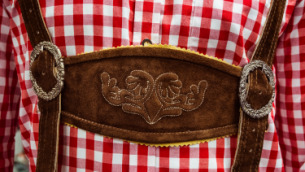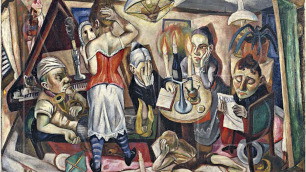Lesson 4: Modal Verbs
4.1 The Meaning of the Modal Verbs and the Conjugations
In this section, you will find both the meaning and an illustrative example for each verb. Once you've got a handle on the meaning, we will move on to full example sentences.Usually, the ich, du, and er/sie/es forms of the modal verbs conjugate differently than you'd expect. However the wir, ihr and sie/Sie forms conjugate as you'd expect them to.
wollen
Wollen means to want. It's all about something you wish for. That wish may or may not ever come true, but you still want it. "I want to earn a million dollars!" That is wollen.| ich will | wir wollen |
| du willst | ihr wollt |
| er/sie/es will | sie/Sie wollen |
sollen
Sollen means should. We should all eat more fruits and vegetables and we should go to bed a little earlier. Sometimes we do, sometimes we don't.| ich soll | wir sollen |
| du sollst | ihr sollt |
| er/sie/es soll | sie/Sie sollen |
können
Können means to be able to, or simply can. If you've driven a big moving truck before, then you have learned how to do it, and you can do it. How well you do it, well, that's another question. The main thing is: you can.| ich kann | wir können |
| du kannst | ihr könnt |
| er/sie/es kann | sie/Sie können |
mögen
Mögen means to like. Since you're here, you obviously like German and you like to learn German with the news.| ich mag | wir mögen |
| du magst | ihr mögt |
| er/sie/es mag | sie/Sie mögen |
möchten
Möchten is very similar to mögen because it means would like. You obviously would like to learn more German!| ich möchte | wir möchten |
| du möchtest | ihr möchtet |
| er/sie/es möchte | sie/Sie möchten |
dürfen
Dürfen means to be allowed to. Dürfen always has to do with permission, so it might be something that's serious, in the case of your parents telling you to be home by a specific time, or it might be official. An example for an official permission would be that if you are a licensed electrician, you are allowed to work with certain electrical systems based on your license.| ich darf | wir dürfen |
| du darfst | ihr dürft |
| er/sie/es darf | sie/Sie dürfen |
Nicht dürfen means not allowed to, meaning there is no permission for something. If you are not a licensed electrician, you are not allowed to install electrical systems. Period.
müssen
Müssen means must and has to do with requirements. When we drive, we must follow the rules of the road. We must pay our taxes, and almost all of us must work for a living.| ich muss | wir müssen |
| du musst | ihr müsst |
| er/sie/es muss | sie/Sie müssen |
Nicht müssen is a lovely bit of Germanic culture that means you can if you want, but you should feel no pressure. A friend might invite you over for a coffee, but if your friend knows you've got a lot going on at the moment, then it's nicht müssen. Because you can go over for that coffee if you want, but no pressure. You can always get together another time.
4.2 Example Sentences with Modal Verbs
Here are example sentences using the modal verbs you've just learned. Click the link to see the news story this sentence is related to.Note that the modal verbs all function like that unusual verb you learned before, werden (Lesson 2.1), as an auxiliary verb, and you need another full verb at the end of the sentence.
wollen
Manche Leute wollen weniger Fleisch essen.Some people want to eat less meat.
sollen
Wir sollen mehr Musik hören. Musik ist gut für uns.We should listen to more music. Music is good for us.
können
Verbraucher können immer mehr Windenergie nutzen.Consumers can increasingly use more wind energy.
No second verb required:
Sie können ein bisschen Deutsch.
You can speak a bit of German.
mögen
No second verb required:Viele Leute mögen Tee.
Many people like tea.
möchten
Viele Leute möchten Schokolade essen.Many people would like to eat chocolate.
dürfen
Nur Griechenland darf seinen Käse “Feta-Käse” nennen.Only Greece may call its cheese Feta.
müssen
Alex Jones muss 50 Millionen Dollar zahlen.Alex Jones has to pay 50 million dollars.

























